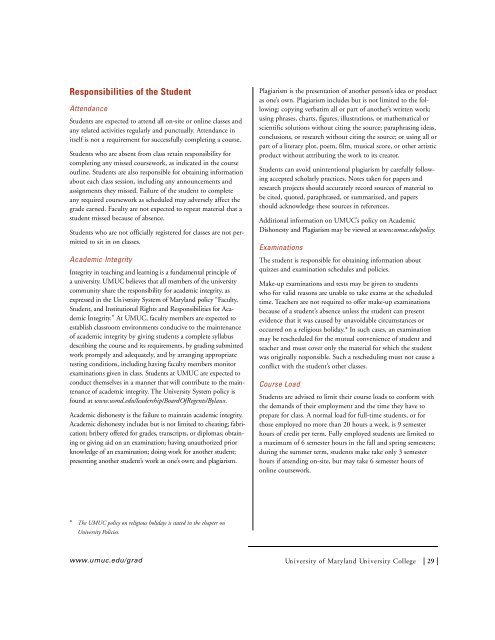A+B. Intro_SJ.1 - University of Maryland University College
A+B. Intro_SJ.1 - University of Maryland University College
A+B. Intro_SJ.1 - University of Maryland University College
Create successful ePaper yourself
Turn your PDF publications into a flip-book with our unique Google optimized e-Paper software.
Responsibilities <strong>of</strong> the Student<br />
A t t e n d a n c e<br />
Students are expected to attend all on-site or online classes and<br />
any related activities regularly and punctually. Attendance in<br />
itself is not a requirement for successfully completing a course.<br />
Students who are absent from class retain responsibility for<br />
completing any missed coursework, as indicated in the course<br />
outline. Students are also responsible for obtaining information<br />
about each class session, including any announcements and<br />
assignments they missed. Failure <strong>of</strong> the student to complete<br />
any required coursework as scheduled may adversely affect the<br />
grade earned. Faculty are not expected to repeat material that a<br />
student missed because <strong>of</strong> absence.<br />
Students who are not <strong>of</strong>ficially registered for classes are not permitted<br />
to sit in on classes.<br />
Academic Integrity<br />
Integrity in teaching and learning is a fundamental principle <strong>of</strong><br />
a unive r s i t y. UMUC believes that all members <strong>of</strong> the unive r s i t y<br />
community share the responsibility for academic integrity, as<br />
e x p ressed in the Un i versity System <strong>of</strong> Ma ryland policy “Fa c u l t y,<br />
Student, and Institutional Rights and Responsibilities for Ac a -<br />
demic In t e g r i t y.” At UMUC, faculty members are expected to<br />
establish classroom environments conducive to the maintenance<br />
<strong>of</strong> academic integrity by giving students a complete syllabus<br />
describing the course and its re q u i rements, by grading submitted<br />
work promptly and adequately, and by arranging appropriate<br />
testing conditions, including having faculty members monitor<br />
examinations given in class. Students at UMUC are expected to<br />
conduct themselves in a manner that will contribute to the maintenance<br />
<strong>of</strong> academic integrity. The Un i versity System policy is<br />
found at www.usmd.edu/leadership/BoardOf Regents/By l a w s .<br />
Academic dishonesty is the failure to maintain academic integrity.<br />
Academic dishonesty includes but is not limited to cheating; fabrication;<br />
bribery <strong>of</strong>fered for grades, transcripts, or diplomas; obtaining<br />
or giving aid on an examination; having unauthorized prior<br />
k n owledge <strong>of</strong> an examination; doing work for another student;<br />
p resenting another student’s work as one’s own; and plagiarism.<br />
Plagiarism is the presentation <strong>of</strong> another person’s idea or product<br />
as one’s own. Plagiarism includes but is not limited to the following:<br />
copying verbatim all or part <strong>of</strong> another’s written work;<br />
using phrases, charts, figures, illustrations, or mathematical or<br />
scientific solutions without citing the source; paraphrasing ideas,<br />
conclusions, or research without citing the source; or using all or<br />
part <strong>of</strong> a literary plot, poem, film, musical score, or other artistic<br />
product without attributing the work to its creator.<br />
Students can avoid unintentional plagiarism by carefully following<br />
accepted scholarly practices. Notes taken for papers and<br />
research projects should accurately record sources <strong>of</strong> material to<br />
be cited, quoted, paraphrased, or summarized, and papers<br />
should acknowledge these sources in references.<br />
Additional information on UMUC’s policy on Academic<br />
Dishonesty and Plagiarism may be viewed at w w w. u m u c . e d u / p o l i c y.<br />
E x a m i n a t i o n s<br />
The student is responsible for obtaining information about<br />
quizzes and examination schedules and policies.<br />
Make-up examinations and tests may be given to students<br />
who for valid reasons are unable to take exams at the scheduled<br />
time. Teachers are not required to <strong>of</strong>fer make-up examinations<br />
because <strong>of</strong> a student’s absence unless the student can present<br />
evidence that it was caused by unavoidable circumstances or<br />
occurred on a religious holiday.* In such cases, an examination<br />
may be rescheduled for the mutual convenience <strong>of</strong> student and<br />
teacher and must cover only the material for which the student<br />
was originally responsible. Such a rescheduling must not cause a<br />
conflict with the student’s other classes.<br />
Course Load<br />
Students are advised to limit their course loads to conform with<br />
the demands <strong>of</strong> their employment and the time they have to<br />
prepare for class. A normal load for full-time students, or for<br />
those employed no more than 20 hours a week, is 9 semester<br />
hours <strong>of</strong> credit per term. Fully employed students are limited to<br />
a maximum <strong>of</strong> 6 semester hours in the fall and spring semesters;<br />
during the summer term, students make take only 3 semester<br />
hours if attending on-site, but may take 6 semester hours <strong>of</strong><br />
online coursework.<br />
* The UMUC policy on religious holidays is stated in the chapter on<br />
<strong>University</strong> Policies.<br />
w w w. u m u c . e d u / g r a d<br />
Un i versity <strong>of</strong> Ma r yland Un i versity <strong>College</strong> | 29 |

















